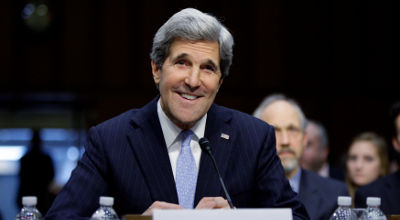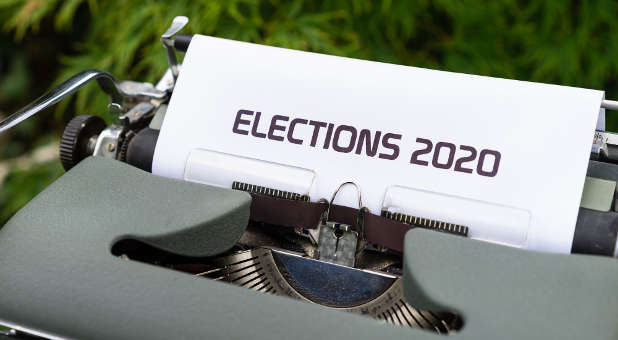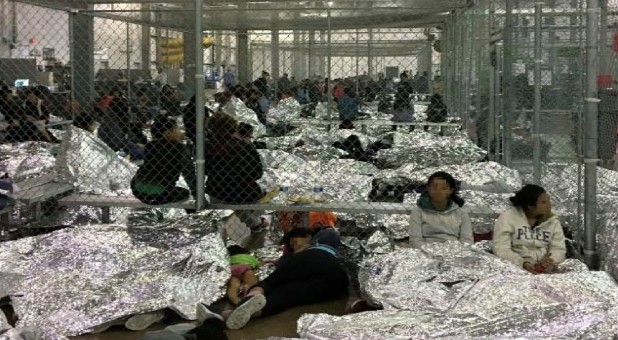The United States has hinted it might try Middle East peace-making once again, but Secretary of State-designate John Kerry is likely to move cautiously, in contrast to U.S. President Barack Obama’s failed, high-profile first-term initiative.
While the possibility of another failure may hang over the White House, Kerry suggested this week that time was running out for a two-state solution with Israel living alongside a sovereign Palestinian state. He said it would be “disastrous” if it did.
When Obama came into power in 2009, he made peace between Israelis and Palestinians a priority, visiting the State Department two days after taking office to announce his choice of former Sen. George Mitchell as his special envoy.
Four years later, the president has little to show for it.
Formal talks between the Israelis and the Palestinians broke down in 2010 within weeks of resuming. Mitchell resigned in 2011 and both sides have since taken steps that have antagonized the other – Israel by building Jewish settlements on land the Palestinians want for a state and the Palestinians by seeking enhanced status at the United Nations.
Against this backdrop, former senior U.S. peace negotiators said they expect Obama to proceed cautiously and to let Kerry, who will be sworn in on Friday, take soundings for any fresh effort. That could allow Obama to avoid investing too much personal capital in a fresh effort until there was a prospect of real progress.
“I believe that Kerry and Obama are committed and interested in doing something,” said Aaron David Miller, a vice president at the Woodrow Wilson International Center for Scholars, who advised Democratic and Republican secretaries of state on Arab-Israeli peace negotiations from 1982 to 2003.
However, Miller said the two sides were too far apart right now for any big initiative to succeed and that a more circumspect approach made more sense.
“Unlike last time around … (Obama) is going to be quite patient and deliberate in avoiding the mistakes he made during his previous run, which is why it’s really hard right now … to predict the arc of any sort of big initiative,” he said.
While neither Kerry nor Obama have specified what approach they plan, some of Kerry’s allies outside government have suggested that he wants to move aggressively.
Miller and other former U.S. diplomats interviewed said they were not privy to what plans, if any, the two men might have.
However, they said Obama’s second term offered a new chance with Kerry, a new chief diplomat who has made no secret of his interest in the Middle East, and that the January 22 Israeli elections created a somewhat better environment for peace despite the intrinsic challenges.
Having watched the peace process unfold, and unravel, from his perch on the Senate Foreign Relations Committee over the last three decades, analysts said Kerry has a deep knowledge of the issue and its players.
Among the obstacles are the divisions within the Israeli and Palestinian societies about making peace; a sense of disbelief that peace itself may ever be possible; and the rise of Islamist parties, notably in Egypt, that may be less supportive of it.
‘Disastrous’
At his Jan. 24 confirmation hearing, Kerry said “my hope … my prayer is that perhaps this can be a moment where we can renew some kind of effort to get the parties into a discussion.”
“We need to try to find a way forward, and I happen to believe that there is a way forward,” he said, but added:
“I also believe that if we can’t be successful, the door … to the possibility of a two-state solution could shut on everybody and that would be disastrous.”
The two-state solution refers to the idea of Israel living alongside a sovereign Palestinian state in the West Bank and the Gaza Strip, territories it seized in the 1967 Middle East War.
To achieve this, the two sides would have to agree on borders, Jewish settlements, the status of Jerusalem and the fate of Palestinian refugees, compromises that have eluded them for decades.
Martin Indyk, vice president of foreign policy studies at the Brookings Institution think tank, said there were signs of Obama’s skepticism about the odds for peace. He cited a piece by The Atlantic’s Jeffrey Goldberg in which Obama is reported to have said “Israel doesn’t know what its own best interests are.”
Indyk said that if Obama believed “that the prime minister of Israel doesn’t have the best interests of Israel at heart, is a political coward, isn’t going to take risks for peace – if that your basic view, why would you bother, why would you try?”
“On the other side is John Kerry’s belief that the window is closing on the two-state solution and that it is an obligation of the United States to try to stop that from happening, at least to preserve the hope of a two-state solution,” he said.
‘TESTING THE WATERS’
“The combination could lead to a willingness on the part of the president to have the secretary of state try again, but rather than jump in … it’s likely to be a testing of the waters,” Indyk, the former top U.S. diplomat for the Middle East as well as a former U.S. ambassador to Israel, said.
The fact that Israeli Prime Minister Benjamin Netanyahu and his right-wing allies lost ground in Israel’s election while centrists did better than expected suggested Israel’s next coalition government may tilt more toward peace-making.
“I actually think that this election opens doors, not nails them shut,” outgoing Secretary of State Hillary Clinton said on Tuesday, adding that a significant number of Israelis were signaling a desire for different approach on peace with the Palestinians as well as on domestic policy.
Dennis Ross, a long-time U.S. Middle East peace envoy now at the Washington Institute for Near East Policy think tank, said one danger would be if the Palestinian society evolved toward an Islamist rather than a nationalist identity.
“The combination of disbelief on the part of each side and the issue of the future identity of the Palestinians being at stake argues for making an effort,” he said. “I think that it’s likely that the new secretary of state will make an effort.”
Editing by Warren Strobel and David Brunnstrom.
© 2013 Thomson Reuters. All rights reserved.
See an error in this article?
To contact us or to submit an article






















